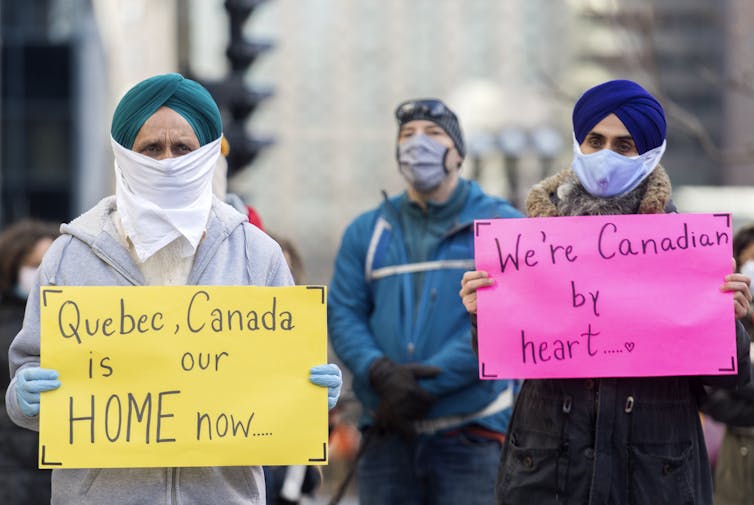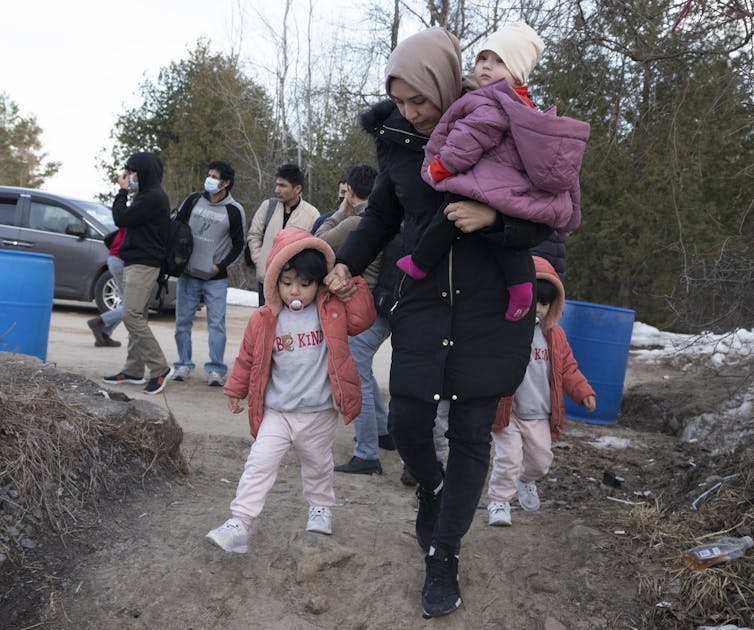On March 31, 2023 the Ford government in Ontario ended the expanded health-care funding it put in place when the COVID-19 pandemic began in March 2020.
This funding allowed everyone in Ontario to access essential health care. For the hundreds of thousands of people living in the province without health insurance, this meant access to necessary surgeries, emergency care and labour and delivery services without thousands of dollars in hospital and physician bills.
As a midwife who has worked in Toronto for over 20 years, largely with uninsured populations, and an associate professor who has focused my research and activism on this issue, I am acutely aware of how these cuts will impact pregnant people and ultimately all Canadians.
Insurance status
There are many reasons someone may not have health insurance. These can include homelessness; mental health issues; addiction; having documents withheld by an abusive partner, landlord or employer; and, for a growing number of people who live and work across Canada, lack of legal immigration status.
Increasingly, people may spend years with precarious immigration status, all the while building a life here and eagerly waiting for applications to come through. For example, a student applying for a work permit may fall out of status while one application expires and another comes through.

THE CANADIAN PRESS/Graham Hughes
Research shows that uninsured people are more likely to get care later in pregnancy and less care overall. It is well accepted across medicine that prenatal care is linked to healthier outcomes for pregnant people and babies. In particular, prenatal care is associated with dramatically lower rates of preterm birth and low birth weight babies.
Health-care costs for babies born too small and too early are among the highest of all health-care expenditures. It’s estimated that Canada spends about $8 billion per year in health costs related to preterm babies. Babies born too small and too early are also among the most likely to have lifelong health issues, including profound cognitive and physical impairment.
There is a simple bottom line argument here: prenatal care is cheap and sick babies are very expensive.
Refugees in all but name
With increasing global health and economic disparities, we are seeing more people cross and/or stay within our borders to work and live. Like many others who work with these populations, I can say that many who do not have refugee status are refugees in all but name: escaping impossible conditions and trying to build a future here.

THE CANADIAN PRESS/Ryan Remiorz
The same week the Ontario government discontinued its expanded health-care coverage, eight people drowned trying to cross the St. Lawrence River in Québec while trying to escape deportation. These are the acts of desperate people.
While hospitals are not going to turn people away in emergencies, many pregnant people need access to hospital-based care before there is an emergency, and in fact to avoid an emergency. For example, someone who needs a caesarean section because labour would be too risky, may be required to pay $6,000 or even more before they can access a provider.
For some people, this could mean deciding between rent, feeding their children or getting basic health care.
Inevitable emergencies
It is inevitable that many people will not have access to prenatal care and will wind up in an emergency department, where the hospital will be ethically required to provide care anyway. Hospitals requiring advance payment does not make people less pregnant, less high-risk or less in need of a caesarean. It means people going without care and coming to the hospital in need of emergency surgery, which has the highest cost and risks of any birth.
Adding another layer of complexity to this puzzle is that, as global caesarean section rates skyrocket, more and more undocumented migrants in Canada have had a previous caesarean section. For many, this means the safest option for delivery is a repeat caesarean section.
Putting all the pieces together, discontinuing expanded health-care funding means higher numbers of already marginalized people having less prenatal care, more preterm births and low birth weight babies, and more emergency caesarean sections for delivery — all of which result in worse outcomes, more cost on the system and more moral distress on health care providers. How is this a good idea from any angle?
A study released just one week before these cuts were announced showed the many benefits of having the expanded funding in place, including improved access to prenatal care. It also demonstrated the relief health-care providers felt at not having the moral distress of having to decide who was able to access necessary care.
Lessons learned
The expanded funding put in place during COVID-19 revealed a few things.
First, the fact that it was implemented is an acknowledgement that it was needed. If we have universal health coverage for all who live here, why did we need the program in the first place?
Second, it demonstrated that it was not a massive burden to our health-care system to provide this care. The Ontario Medical Association estimated this program cost $15 million over three years. Even if it was several times more, this is very little of our health-care budget. By providing primary and preventive care, as well as prenatal care, the program likely saved money by avoiding more expensive acute and emergency care, and it certainly saved lives.
Third, this program brought caregivers and organizations together, with health-care associations asserting that this is a health equity issue, not a medical tourism issue. Immigration status has long been established as a social determinant of health, along with factors including poverty, racialization and education level. It is about time we address this issue in Canada.
The decision to discontinue extended care is going to cost us. Not just in terms of health-care dollars — it is always better to treat high blood pressure than manage a stroke — but in terms of our ethics.
Several decades ago, we decided as a country that everyone — rich or poor — deserves access to health care. Canadians have taken pride in this and it is part of our national identity. Until everyone is covered, we need to acknowledge that we do not, in fact, have universal health care, and decide what this means to us as a country.




